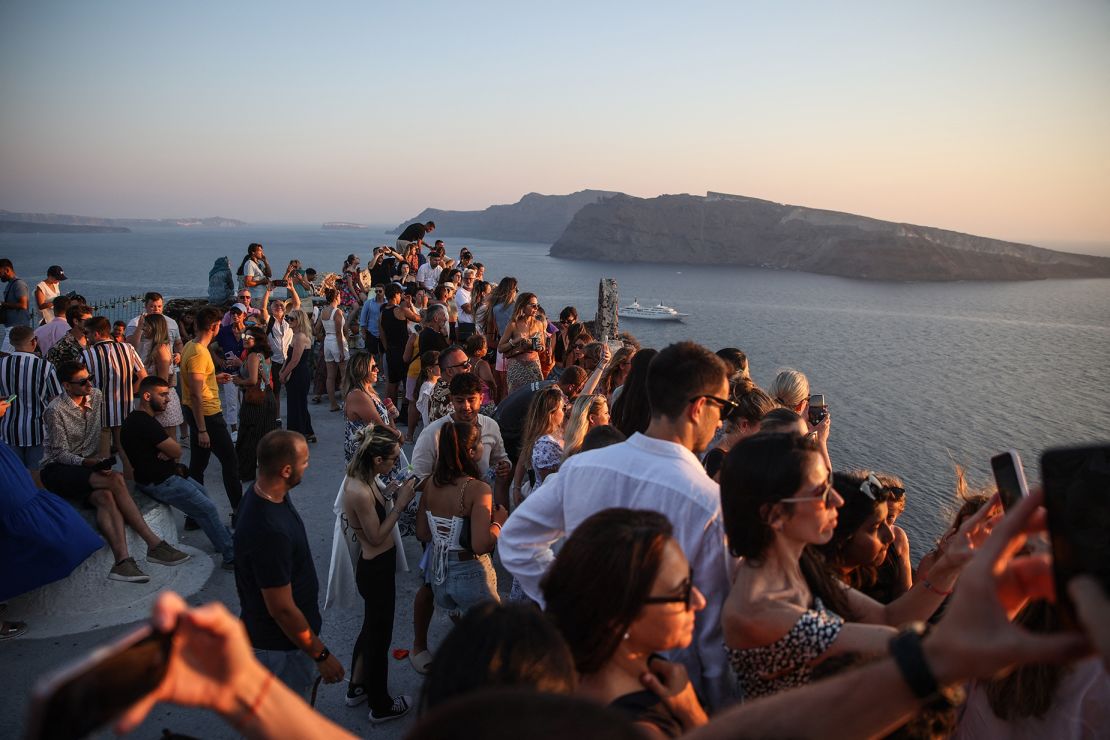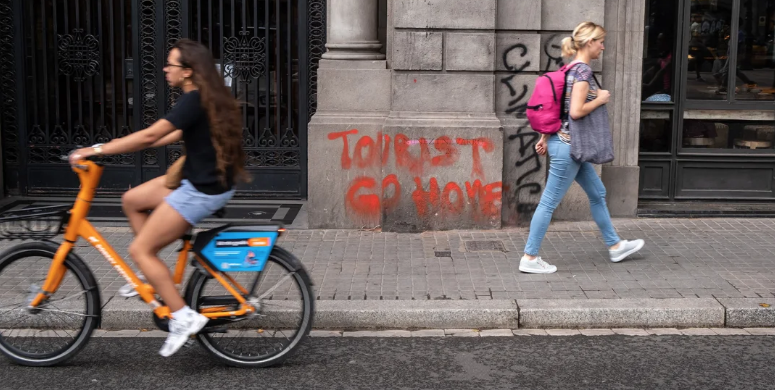||| FROM CNN |||
Protests in the streets. Graffiti warning tourists to go home. Local populations dwindling as short-term rentals mushroom and price residents out.
It feels like this was the year that tourism turned nasty – and local communities started pushing back.
Venice has started charging daytrippers an entry fee, while one busy Swiss town has announced it wants to follow suit. Locals have staged protests in Mallorca and Barcelona.
And while it has come to a head in Europe, this is a global phenomenon. A Japanese town overlooking Mount Fuji erected view-blocking barriers in May (then removed them in August). Bali introduced a tourist entry tax for foreign visitors in February. And US national parks are full to bursting – with 13 million more visits in 2023 than in 2022, according to NPS numbers. In peak season, visitors must book ahead to enter.
Increased enthusiasm doesn’t seem to correlate with increased respect for the landscape, however. During the 35-day government shutdown in 2019, visitors did damage to Joshua National Park that would take centuries to rectify, officials said at the time.
The risk, as professor and environmental specialist Emily Wakild wrote for CNN in 2023, is of “loving a place to death.”
“This isn’t something new, or something which has just happened,” says Noel Josephides, chairman of European tour operator Sunvil.
Josephides thinks the current chaos was predictable years ago. He says he feels “ashamed” of what the industry has done to destinations.
“I’ve lost faith in what our business is about,” he says about the havoc the tourism has wreaked in Europe.
Other veterans agree. The only question is whether we can emerge from it and reset travel to become the beautiful experience we’ve all known and treasured.
‘The industry forgot about local goodwill’

Justin Francis has spent his life feeling the uncomfortable effects of mass tourism.
He grew up in one of the UK’s most visited cities, Bath – which he remembers as being particularly popular with Americans when he was a child in the 1970s.
“I remember being astonished at these alien-like people, and how loud they were – shouting to each other,” he says.
“They stood around and blocked the way. I felt invisible.”
It was these early experiences that led Francis to found Responsible Travel – a tour operator working with small, locally owned properties and guides – in 2000.
“Tourism has gone right in many places, but broadly [the industry] has lost the trust of local people,” he says.
“It’s been really, really bad this year,” he says of the protests and overtourism incidents. It’s been brewing for a really long time – it didn’t take a lot of imagination or foresight [to predict].
“The tourism industry forgot about its most precious asset: the goodwill of locals. The edifice collapses without that. It’s been lost in many places and will be hard to win back.”
Francis puts it down to a combination of factors: the growth of low-cost airlines, vacation rentals, social media (which creates stampedes to “in” destinations) and expanding economies – meaning more people can afford to travel.
Now, he says, we’re left with the “stark realization that tourism is an aggressive industry like most others, and needs regulating and controlling.”
**If you are reading theOrcasonian for free, thank your fellow islanders. If you would like to support theOrcasonian CLICK HERE to set your modestly-priced, voluntary subscription. Otherwise, no worries; we’re happy to share with you.**









Big difference between Barcelona and here. Our fragile economy and lively hood of many local residents depends on tourism.
I can’t help starting with the fact that no one asked the Indians if we strangers could move in and take over lands and waters that were, without the need of encouragement, continuouslyproductive.
A lot of things are fragile: the ecology (which is rented to tourists), low income housing markets (also an economic issue), and community (also rented to tourists). And yes, the loss of the fish, farming, gravel and sand, and timber (and cobblestones from Waldron’s Point Disney) industries left our county and its inhabitants many with skills valuable then and today with no means of earning a living. We needed then and still need alternatives to our once-predominant economies that are now largely vestigial. Many old timers sold off a lot a year from their fading farms to create income. These people were severely impacted by the adoption of the Comprehensive Plan which was put in place by newcomers (who today claim to be old-timers or their descendants) who wanted to reserve vistas … and also make possible rational, feasible utility services to serve otherwise unplanned development.
Darcie Nielsen, once a county commissioner, told how in her childhood waterfront property was a trash asset: no one could farm those edges. But a good way to describe what happened next was the multiplication from two lawyers in the county (I knew them both) to the number we have now, along with real estate brokers and agents to serve the division and marketing of view properties for the new class who gradually called themselves”natives” as well as those who summer here over half a year to avoid state income taxes in Arizona, California and Hawaii where they overwinter.
Tourism provides salaries and tax income, this last item, particularly retail sales and real estate taxes, and an economy whose market is broad enough to support facilities which even self-professed old timers expect and in the case of medical facilities, need.
The one feature of tourism that does stand out is the fact that unlike real estate (the comprehensive plan),and the building and land use codes, it is unregulated. The tourism business is now so large that except for craftspeople (builders, plumbers, electricians and contractors), a second-aid hospital and the usual government services (schools, P.O., libraries and police protection), no one else is needed except to support these facets of our economy. The environment will sell until it is overused past the point of recovery. The weather may continue to attract a certain class of people, and those intent on escaping cities, though this latter class will fade too, as our county becomes more suburban with a few showpieces (à la Williamsburg) to try to bring back an marketable echo of the past.
The past is a moving target, but two forces, first, a segment of the populace (that segment that responded to recent solicitations for comments), and second, the inertia of a system that intermittently relies on public expression of opinion by voting, and that full times seeks growth and improvement because today, any business, including government, it seems, either grows, adapts, or dies.
In San Juan County, some adaptation, the most demanding alternative, might be called for, but there is no going back. What happens next will depend on November’s developments at every level of government. Given this state of affairs, those who choose not to vote will have only themselves to blame.
It does seem that, at the federal level at least, representative democracy has devolved to little more than alternating teams of the same bunch of ivy league lawyers with an opinion poll (formerly known as voting) every two years… Is it any wonder that manufactured charisma and facile populism are more effective at the polls than sane and sensible policy proposals?
How is it even possible to effectively govern 350 million people spread across 3.5 million square miles of territory? Liberal thinkers are reluctant to acknowledge that there really is a culture war happening in the United States. The current situation is about more than which wing of the corporate political bird you prefer to identify with; there are genuine differences in the values, expectations and needs of people living in different regions of this vast continent. There is a reason there are very few nation-states of the United States’ size; they are difficult to govern effectively without resorting to authoritarian measures. It’s long past time to re-localize government power. We have given away far too much authority to distant bureaucrats. The actual source of all authority lies with the citizenry. That is a radically simple and profound concept and one that we have gotten too far from in this country.
I believe it’s time to stop paying taxes to distant bureaucrats. Reagan was a tool and a fool, but he wasn’t entirely wrong when he said that, “Government IS the problem.” It is time for self determination again. I’m sick and tired of infinite pages of rules and regulations, fee schedules and building codes. We are so hemmed in by incomprehensibly complex tax codes, building codes, municipal codes, health codes, etc. ad nauseam, that small businesses and entrepreneurs are crushed before they can even begin. Big Government works only for Big Business. It’s time to remind ourselves where there actual power resides; with US.
States have a lot of power but they, local governments, schools and universities have contracted it away by accepting federal grants that are conditioned on certain requirements. This is why some states have turned down federal health grants: they would have to permit either “undeserving” people to be treated, or they would have to permit medical procedures that their legislative majorities consider immoral.
Turning down money is tough, particularly faceless federal money. We know who pays local taxes, but federal (and to some extent state) fund sources seem more anonymous. And when money is turned down, some people suffer, just not enough to tip the scale.
And the fact that the federal tax system is progressive makes it seem that those in lower tax brackets don’t contribute to what, federally, is “skimmed off the top,” pleasing those in the lower brackets. As to them, it is”found money.”
For which all pay in the non-monetary conditions attached to federal grants. It’ll be a long time before that dragon, if it is one and if ever, is slain.